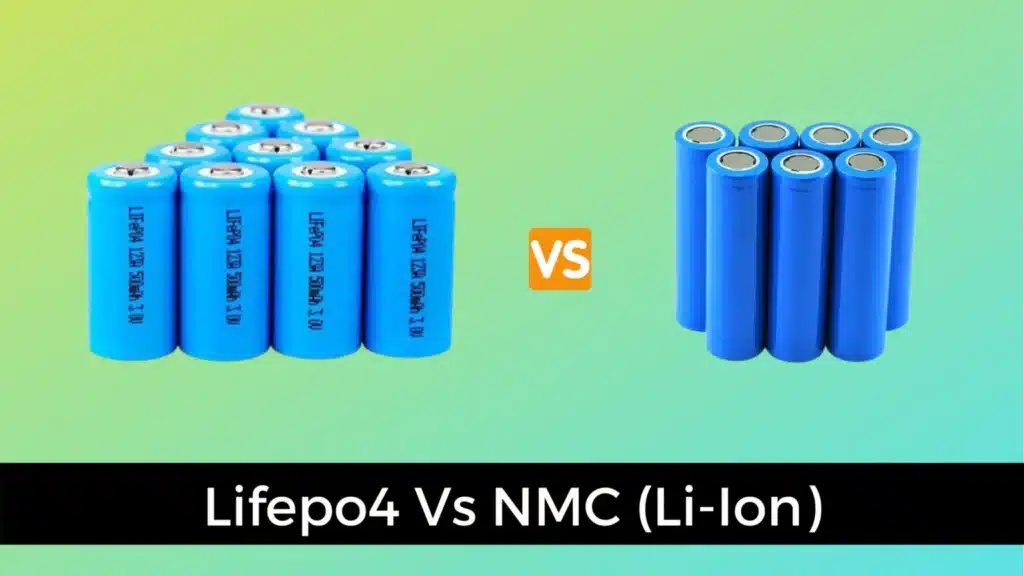Looking for the right battery for your RV, DIY project or portable power? You may be confused about choosing between lifepo4 battery and lithium ion battery. LFP battery is a special type of lithium ion battery. The purpose of this article is to compare the core differences between LiFePO4 and other mainstream lithium ion batteries in terms of safety, cycle life, energy density, cost and the most suitable application scenarios.
Table of Contents
ToggleWhat is lithium iron phosphate battery
Lithium iron phosphate battery is a member of the lithium-ion battery family, just like SUV is a type of car in the automobile category. This battery uses lithium iron phosphate as the positive electrode material, with a nominal voltage of 3.2V. It is known for its long cycle life and high safety, and is commonly used in the energy storage market.
What is lithium-ion battery
Lithium-ion battery is a rechargeable secondary battery. It has high energy density and light weight. Its nominal voltage is 3.7V. It is commonly used in consumer electronics and high-power products. According to the positive electrode material, it can be divided into LCO battery, NMC battery and NCA battery.
Lifepo4 VS lithium ion battery comparison
There are significant differences between lithium iron phosphate batteries and general lithium batteries. The following is a comprehensive comparison from 8 different angles.

Safety
As the positive electrode material, lithium iron phosphate has a very stable chemical structure and is not prone to high-temperature decomposition. Therefore, its biggest advantage is that it is not prone to thermal runaway. In the event that it is accidentally punctured or overcharged, the risk of fire and explosion is much lower than other lithium batteries.
The advantage of other lithium batteries is that they can store more energy in a small volume, so a large amount of energy is compressed into one piece, which is sensitive to high temperature and physical damage. This relies on advanced and complex BMS systems to control safety risks.
Lifespan
We usually measure how long a battery can last by looking at the cycle life indicator, or the number of cycles. Lithium iron phosphate batteries can be charged and discharged for 2,000 to 6,000 times, and are very durable. Many people choose LFP batteries to replace traditional lead-acid batteries.
The cycle life of lithium batteries is shorter, about 500~1000 times, which is affected by usage habits, charging methods, etc. But overall, compared with lithium iron phosphate, there is a big gap.
Energy density
The energy density of lithium iron phosphate batteries is low, only 140-330Wh/L, and their size and weight are relatively large.
Lithium batteries have a high energy density of 360-380 Wh/L, which is about 50% or more higher than lithium iron phosphate batteries. This makes lithium-ion batteries lighter in size and weight.
Power performance
Lithium iron phosphate batteries have high-rate discharge capabilities and more stable voltage under high current output, making them suitable for scenarios that require continuous high-power output. They are like an endurance long-distance runner.
Lithium batteries can release very high currents instantly and provide extremely high peak power. For example, power tools can be started at high power. It is like a sprinter.
Costs
The price of LiFePO₄ batteries has dropped significantly in recent years. In 2024, the average market price has dropped to $59/kWh, which is lower than the mainstream lithium-ion (NMC) battery’s $68.6/kWh. However, considering the thousands of charge and discharge cycles of lithium iron phosphate, lithium iron phosphate is often more cost-effective. Because its cost per use and per year is very low.
Work temperature
Lithium iron phosphate batteries have good high temperature performance. In the summer outdoors or in closed spaces, it is less likely to cause safety risks due to heat accumulation. In low temperature environments, its discharge capacity decreases, so preheating is required.
The comfortable operating temperature range of lithium-ion batteries is 20°C ~ 25°C. They are sensitive to high temperatures, which will affect their safety and lifespan.
Environmental impact
The core materials of lithium iron phosphate batteries are iron and phosphorus, which are very abundant and easy to obtain. It does not contain cobalt, so from a resource perspective, it has less dependence on scarce resources. From an environmental perspective, the mining and processing of iron and phosphorus has less impact on the environment and is safer than heavy metals such as cobalt and nickel.
The core materials of lithium batteries are cobalt and nickel, which are mainly distributed in a few countries such as Congo, which poses supply chain risks. In addition, cobalt mining may be accompanied by environmental pollution problems. Cobalt also involves complex humanitarian and social responsibility issues.
Application
Lithium iron phosphate batteries are commonly used in RV, ship power systems, or off-grid solar energy storage systems. They can meet deep cycle and high safety requirements. The backup power supply for industrial equipment and data centers also requires a service life of more than 8 years, so LifePO4 batteries are also a good choice.
Mobile phones, drones, laptops, Pet tracking, blood pressure monitors and other portable electronic products all prefer lithium-ion batteries, where their advantages of high energy density and light weight can be fully reflected.
If you ask which one is more suitable for you, it depends on your specific application product and whether you value the battery safety, life, or extreme lightness and compactness?
Conclusion
The biggest advantage of lithium iron phosphate batteries is long cycle life and high safety performance, while the highlights of other lithium batteries are high energy density and light weight. By mastering the essential difference between the two, you can more confidently choose the right lithium battery for your equipment or project. Of course, we warmly welcome you to contact us to evaluate the battery type.
